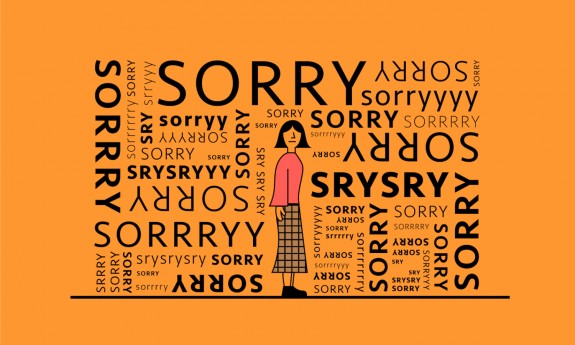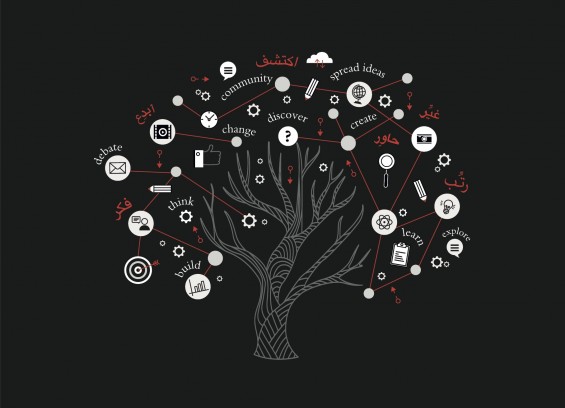
Do you say “sorry” too much? Here’s what to say instead
When we needlessly apologize, we end up making ourselves small and diminish what we’re trying to express, says sociologist Maja Jovanovic.
Think about all the times you use the word “sorry” in a typical day. There are the necessary “sorry”s — when you bump into someone, when you need to cancel plans with a friend. But what about the unnecessary “sorry”s? The “sorry, this may be an obvious idea” at a meeting, the “sorry to cause trouble” when rescheduling a haircut, the “sorry, there’s a spill in the dairy aisle” at the supermarket.
Canadian sociologist Maja Jovanovic believes the “sorry”s we sprinkle through our days hurt us. They make us appear smaller and more timid than we really are, and they can undercut our confidence.
Jovanovic, who teaches at McMaster University and Mohawk College in Hamilton, Ontario, became interested in this topic when she attended a conference four years ago. The four women on a panel were, she says, “experts in their chosen fields. Among them, they had published hundreds of academic articles, dozens of books. All they had to do was introduce themselves. The first woman takes a microphone and she goes, ‘I don’t know what I could possibly add to this discussion’ … The second woman takes the microphone and says, ‘Oh my gosh, I thought they sent the email to the wrong person. I’m just so humbled to be here.’” The third and fourth women did the same thing.
During the 25 panels at that week-long conference, recalls Jovanovic, “not once did I hear a man take that microphone and discount his accomplishments or minimize his experience. Yet every single time a woman took a microphone, an apologetic tone was sure to follow.” She adds, “I found it enraging; I also found it heartbreaking.”
Jovanovic found the outside world not so different: “Apologies have become our habitual way of communicating,” she says. Since then, she’s collected needless apologies from her colleagues and students. One stand-out? “My research assistant said ‘Sorry’ to the pizza delivery guy for his being late to her house,” says Jovanovic. “She said, ‘Oh my gosh, we live in a new subdevelopment. I’m so sorry. Did you have trouble finding this place?’”
We can eliminate the “sorry”s from our sentences — and still be considerate. “The next time you bump into someone,” Jovanovic says, “you could say, ‘Go ahead,’ ‘After you’ or ‘Pardon me.’” Similarly, during a meeting, Jovanovic says, “instead of saying, ‘Sorry to interrupt you,’ why not try ‘How about,’ ‘I have an idea,’ ‘I’d like to add’ or ‘Why don’t we try this?’” The idea is to be polite while not minimizing yourself.
The “sorry”s that fill our written interactions also need to be noticed — and banished. For emails, Jovanovic says, “There’s a Google Chrome plug-in called ‘just not sorry’ that will alert you to all the needless apologies.” With texts, she points out, “Every single one of us has responded to a text you got when you weren’t able to respond right away. What did you say? ‘Sorry.’” She says, “Don’t apologize — say, ‘I was working,’ ‘I was reading,’ ‘I was driving, ‘I was trying to put on Spanx.’ Whatever it is, it’s all good. You don’t have to apologize.”
And, in some of the instances when we’d typically throw in a “sorry,” we could just use the two magic words: “thank you.”
Jovanovic tells of the moment when she realized the effectiveness of gratitude. She says, “Four of us were at a restaurant for a work meeting, and we’re waiting for number five to arrive … I put my sociological cap on, and I thought, ‘What would he say? How many apologies will he give?’ I could barely stand the anticipation. He arrives at the restaurant, and you know what he says? ‘Hey, thanks for waiting.’ … The rest of us said, “Yeah, you’re welcome,” and we all just opened our menus and ordered. Life went on, and everything was fine.”
Another time when “thank you” can work better than “sorry”? When you’re with a friend and you realize you’ve been doing all the talking. Jovanovic says, “instead of saying, ‘Sorry for complaining’ or ‘Sorry for venting,’ you could just say, ‘Thank you for listening,’ ‘Thank you for being there’ or ‘Thank you for being my friend.’”
Besides removing them from our own communications, we should tell other people when they’re overdoing their “sorry”s, suggests Jovanovic.You can start with your family and friends — and if you’d like, go beyond them. She says, “I have been interrupting these apologies for three years now. I’ll do it everywhere. I’ll do it in the parking lot, I’ll do it to total strangers at the grocery store, in line somewhere. One hundred percent of the time when I interrupt another woman and I say, ‘Why did you just say ‘sorry’ for that?’ she’ll say to me, ‘I don’t know.’”
Watch her TEDxTrinityBellwoodsWomen talk here:
ABOUT THE AUTHOR
Daniella Balarezo is a Media Fellow at TEDx. She is also a writer and comedian based in NYC.
This post was originally published on TED Ideas. It’s part of the “How to Be a Better Human” series, each of which contains a piece of helpful advice from someone in the TED community; browse through all the posts here.




